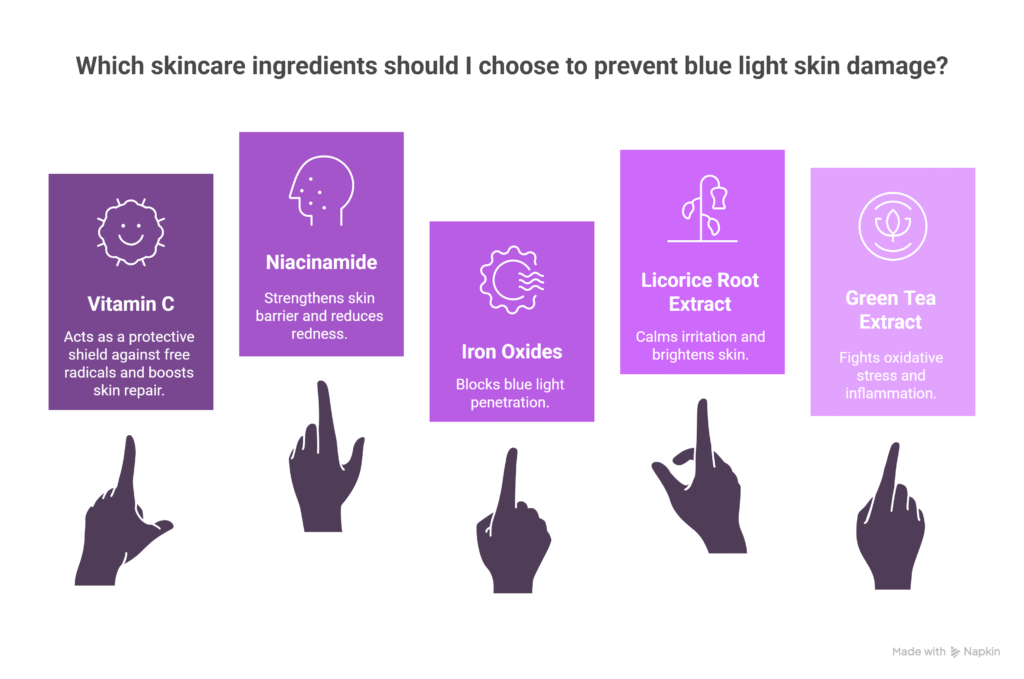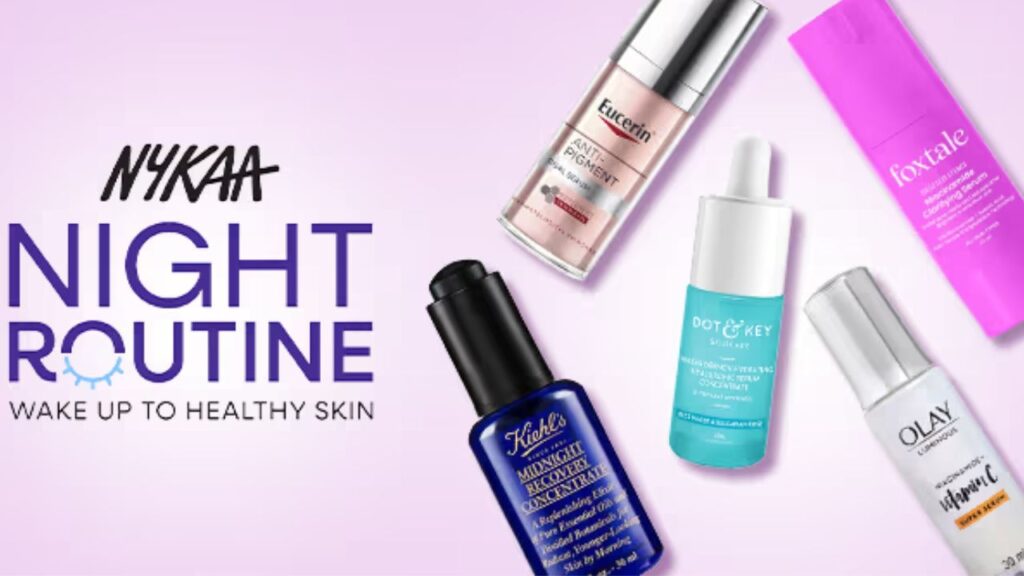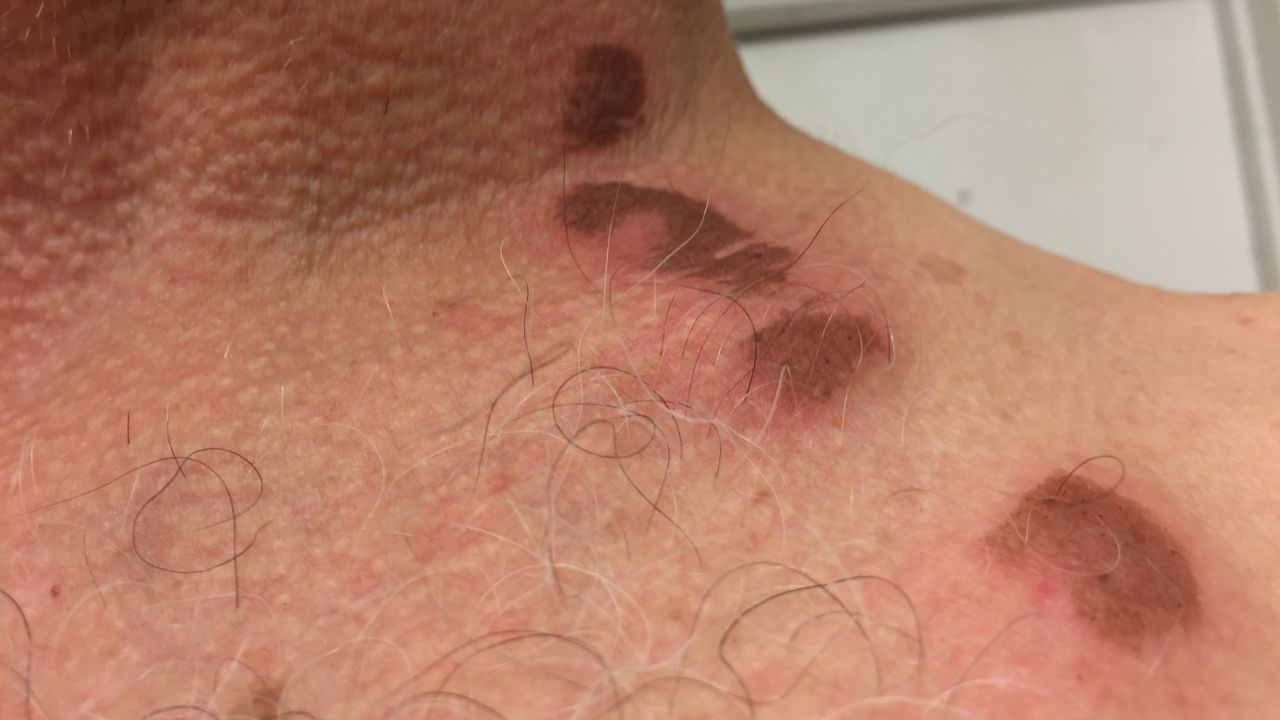As an Amazon Associate, I earn from qualifying purchases
We know that we live in a world surrounded by screens, phones, laptops, tablets, and even LED lights. While they keep us connected and entertained, they also expose our skin to blue light daily. You might wonder.
How worried should you be about blue light and its effects?
The truth is, blue light can quietly damage your skin, causing dryness, dullness, dark spots, and speeding up aging, all without a single sunburn. That’s why knowing how to prevent blue light skin damage is essential if you want to keep your skin healthy and glowing.
In this post, I’ll walk you through what blue light is, how blue light affects your skin, and easy, practical ways to protect your skin from blue light exposure.
Whether you’re asking, How can I protect my skin from blue light? Or curious if vitamin C protects against blue light, I’ve got you covered.
Together, we’ll explore smart habits and skincare tips that help you fight back against this invisible threat. Ready to give your skin the care it deserves?
Let’s dive in.

What Is Blue Light?
You’ve probably heard the term blue light thrown around a lot lately, but what exactly is it? Simply put, blue light is a type of light with a short wavelength and high energy. It comes from the sun, so it’s natural, and also from our everyday screens like phones, laptops, and those bright LED bulbs in our homes.
Think of blue light like that friend who’s fun during the day but can keep you up at night if you’re not careful. It’s everywhere, and because we spend so much time in front of screens, we get more exposure than ever before. This is why many people ask,
How can I protect my skin from blue light?
Unlike the sun’s UV rays, blue light sneaks in silently. It doesn’t burn your skin right away, but over time, it can cause subtle damage. Understanding what blue light is is the first step toward how to prevent blue light skin damage on the face and keeping your skin healthy.
Later, we’ll dig into exactly how blue light affects your skin and share simple ways to protect yourself from blue light exposure.
For now, just know this: blue light is a part of modern life, but with the right care, your skin can stay glowing and strong.
How Does Blue Light Affect Skin Health?
You might be wondering, “How does blue light affect skin health?”
Well, it’s a bit sneaky. Unlike UV rays that cause a quick sunburn, blue light quietly triggers damage deep inside your skin over time. Think of it like tiny sparks that create invisible stress.
When blue light hits your skin, it can cause something called oxidative stress. This means it helps produce free radicals, those unstable molecules that act like tiny troublemakers, attacking your skin cells.
Over time, this stress speeds up aging, making your skin look dull, dry, and sometimes even causing dark spots. It’s like your skin’s natural glow starts to fade, without you even noticing.
This is why addressing blue light-induced skin damage is so important. Studies show that constant exposure, especially from screens, can wear down your skin’s defenses. So, if you’ve been asking, how can I protect my skin from blue light?, you’re on the right track.
Knowing how to prevent blue light skin damage on face isn’t just about looking good; it’s about keeping your skin healthy and strong for the long haul.
In the next sections, I’ll share simple ways to fight back, from ingredients like vitamin C (yes, does vitamin C protect against blue light? Absolutely!) to lifestyle habits that help shield your skin every day.
How to Prevent Blue Light Skin Damage
Let’s get real, blue light is everywhere, and avoiding it completely feels impossible. But here’s the good news: how to prevent blue light skin damage isn’t as complicated as it sounds. It’s about small changes that add up to big skin wins.
First, think of your skin like a shield. The stronger it is, the better it can defend against the invisible stress from screens and LED lights. So, how can I protect my skin from blue light? Start with basics like sunscreen, but not just any sunscreen.

Credit: everydayhealth.com
Look for one that says it blocks blue light, often using ingredients like iron oxides or zinc oxide. What blocks blue light on skin? These minerals act like tiny mirrors, bouncing harmful rays away before they can do damage.
Next, add a daily dose of vitamin C to your routine. I’m not just saying that because it’s trendy, vitamin C really helps neutralize those pesky free radicals triggered by blue light. If you’ve wondered, does vitamin C protect against blue light?, Yes, it’s a powerful helper in your skin’s defense team.
Moisturizing is another key step. A hydrated skin barrier acts like a fortress, making it harder for blue light to sneak in and cause trouble. Plus, skincare packed with antioxidants, think green tea, niacinamide, or licorice root, gives your skin extra backup.
And don’t forget the habits! Simple moves like using night mode on your devices, wearing blue light glasses, or taking regular breaks from screens can reduce your overall exposure.
When you ask yourself how to protect skin from blue light, remember it’s a mix of smart products and lifestyle tweaks.
Smart Ways to Protect Your Skin from Blue Light
Now that you know how to prevent blue light skin damage, let’s dive into some simple, smart tips you can start today.
- Use sunscreen with blue light blockers. Not all sunscreens are made equal. Choose ones that contain iron oxides or zinc oxide. These ingredients help shield your skin from blue light. So, when you ask, what blocks blue light on skin? These are your go-to protectors.
- Apply vitamin C every morning. This powerful antioxidant brightens your skin and fights off free radicals caused by blue light exposure. Wondering, does vitamin C protect against blue light? Yes! It’s like giving your skin a daily shield from damage.
- Keep your skin moisturized. A strong, hydrated skin barrier is your first line of defense. Moisturizers help repair and maintain this barrier so blue light can’t easily harm your skin.
- Look for antioxidant-rich skincare. Ingredients like green tea, niacinamide, and licorice root not only soothe your skin but also reduce damage from blue light and help fade dark spots.
- Wear blue light glasses or use screen shields. If you spend long hours in front of screens, these can reduce your exposure and protect your skin.
- Switch to night mode or install blue light filters on your devices. This simple trick lowers the blue light load, especially during evening hours.
- Take frequent screen breaks. Every hour, step away from your screen for a few minutes. Less screen time means less blue light exposure.
These easy habits answer common questions like how to protect skin from blue light and how to protect yourself from blue light exposure without changing your lifestyle too much.
The key is consistency and using a combination of smart skincare and everyday choices.
Which skincare ingredients should I choose to prevent blue light skin damage?

These ingredients aren’t just buzzwords; they’re backed by science and trusted by dermatologists. Incorporating them into your daily routine can help you tackle blue light damage while keeping your skin healthy and radiant.
How to Build a Blue Light-Safe Skincare Routine
Let me tell you something real, I didn’t even know blue light could mess with my skin until I noticed my face looking tired and dull, even though I hadn’t been out in the sun much.
Turns out, the culprit was right in front of me, literally. My phone, my laptop, my LED lights… all quietly contributing to blue light-induced skin damage.
If you’re wondering how to prevent blue light skin damage without overcomplicating your skincare routine, I’ve got you.
Let’s keep it simple and effective, like a cozy daily ritual that loves your skin back.
Morning Routine: Shield Before the Screens
Start with a gentle cleanser. No need for anything fancy, just something that leaves your skin feeling fresh, not tight.
Then comes vitamin C, my morning hero. I call it “liquid sunshine” because it brightens, protects, and gives your skin a fighting chance against free radicals. If you’ve asked,
Does vitamin C protect against blue light?
Yes, it does. It’s one of the best natural shields out there.
Next, lock in the goodness with a light, hydrating moisturizer. Why? Because a well-moisturized skin barrier is like a well-armored wall, it keeps the bad stuff out, including the sneaky blue light from screens.
And don’t forget sunscreen, even if you’re indoors. Look for formulas that contain iron oxides or zinc oxide. These ingredients physically block blue light on the skin, not just UV rays. So if you’ve ever asked, “What blocks blue light on skin?”, this is your answer.
Night Routine: Repair and Recharge
At night, your skin gets a chance to heal. I like to start with a double cleanse if I’ve been wearing makeup or SPF. A clean canvas makes a big difference.
Then I use a serum packed with antioxidants, think niacinamide, green tea, or licorice root. These ingredients help soothe and repair skin, especially if you’ve been staring at screens all day. They’re like a night shift team working hard while you sleep.

Finish with a rich moisturizer. Your skin loses water while you sleep, and blue light can make dryness worse. Keeping your skin hydrated overnight helps strengthen your barrier for tomorrow’s battles.
Bonus Tips (Because Real Life Isn’t Always Perfect)
Some nights I forget a step, and that’s okay. What matters is showing up for your skin consistently. Just like we care for our phones, it’s time we give our skin the same attention.
If you’ve ever typed “how to protect yourself from blue light exposure” into Google, know this: skincare is just one piece. Taking screen breaks, using night mode, or wearing blue light glasses are all small habits that add up.
When you build this kind of routine, you’re not just looking after your skin, you’re telling yourself, “Hey, I matter too.” Whether you’re wondering how to protect skin from blue light, how to prevent blue light skin damage on the face, or just curious how blue light affects your skin, it all comes down to daily care, love, and smart habits.
Now, take a deep breath and start with one step. Your screen isn’t going anywhere, but your glow? That’s totally in your hands.
How Worried Should You Be About Blue Light?
Okay, real talk. When I first heard about blue light damaging skin, I thought, “Great. As if I didn’t have enough to stress about.” I mean, we already deal with UV rays, pollution, and now our phones too?
But here’s the thing: you don’t have to panic. Seriously. Blue light can affect your skin, but that doesn’t mean you need to toss your phone or live in a cave. It just means being aware and a little proactive.
Blue light is part of everyday life. It comes from the sun, your laptop, and our LED lights. Yes, blue light can harm your skin. It can generate free radicals, leading to a dull complexion and potentially accelerating the aging process. But compared to UV damage, it’s more like a quiet, slow drizzle than a sudden downpour.
That’s why addressing blue light-induced skin damage is more about small, steady habits than big, scary changes.
If you’ve been asking, “How worried should you be about blue light?”, think of it like this: it’s a real issue, but manageable. Just like we wear SPF for sun protection, we can protect our skin from blue light with the right ingredients, screen habits, and lifestyle tweaks.
I started small, just adding vitamin C in the morning and switching my phone to night mode at night. Over time, I felt more in control, less overwhelmed.
So if you’re wondering, “How can I protect my skin from blue light without flipping my life upside down?”, start with one easy change. Then build from there.
Final Thoughts: Healthy Habits for Skin That Glows
Let’s be honest, no one wakes up thinking, Today I’ll protect my skin from blue light. Life’s busy. Between work, scrolling, indulging in that new drama marathon, and replying to endless group chats, skincare often takes the back seat. I love being there, more times than I’d like to admit.
But here’s the twist: your skin doesn’t need perfection. It needs consistency. And when it comes to how to prevent blue light skin damage, it boils down to small, loving habits that add up over time.
Start with awareness, know that blue light is everywhere, from sunlight to screens to LEDs. Then act on it. Wear sunscreen with blue light blockers, layer on your vitamin C (yes, it does protect against blue light), and keep your skin barrier strong with hydration and antioxidants.
If you’ve been wondering, “What blocks blue light on skin?”, think iron oxides, niacinamide, and licorice root.
Protecting your skin doesn’t mean ditching your digital life. It means making room for little rituals, like switching your phone to night mode or taking that 2-minute break between Zoom calls. That’s how to protect yourself from blue light exposure without flipping your routine upside down.
Your skin doesn’t expect you to be perfect. It just wants you to show up.
Start with one change today, and your skin will thank you.
FAQ: Quick Answers About Blue Light and Skin
Quest: Does the sun give off blue light, too?
Ans. Most blue light comes from sunlight.
Quest: How worried should I be about blue light?
Ans: Don’t panic. It’s manageable with daily care.
Quest: What’s the best ingredient for blue light protection?
Ans: Vitamin C. It protects, brightens, and repairs skin.
Quest: Can sunscreen block blue light?
Ans: Yes, if it contains iron oxides or zinc oxide.
As an Amazon Associate, I earn from qualifying purchases

